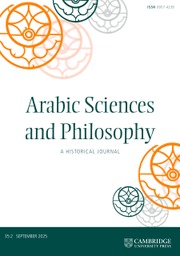Article contents
A FEW NOTES ON [Hdotu]UNAYN'S TRANSLATION AND IBN AL-NAFĪS' COMMENTARY ON THE FIRST BOOK OF THE APHORISMS
Published online by Cambridge University Press: 29 April 2002
Abstract
The Hippocratic Aphorisms is a well-known treatise which was very popular throughout the ages. This paper studies the Arabic translation of [Hdotu]unayn ibn Ishaq, the renowned Arab translator, of the first book of the Aphorisms as well as the commentary of Ibn al-Nafīs, the thirteenth-century Arab doctor, on the same book. This study highlights the difficulties that occasionally confronted the Arab commentator while commenting. The obscurity of a few Hippocratic sentences as well as [Hdotu]unayn's interpretation and alteration in meaning were probable sources for those difficulties. Ibn al-Nafīs, however, was unaware of the role played by [Hdotu]unayn in shaping the Arabic text. Ibn al-Nafīs reflected a deep trust in the Arabic text to the degree of commenting on every single word. He used both his intellect and his knowledge of other commentaries to solve those problematic phrases. He did not exhibit an interest in philological matters to help explain the text. His commentaries reflect his respect and appreciation for both Hippocrates and Galen, the latter of whom exercised some influence on [Hdotu]unayn and Ibn al-Nafīs in their understanding of the work. Nonetheless both [Hdotu]unayn and Ibn al-Nafīs showed traces of independence from Galen's influence.
Information
- Type
- Research Article
- Information
- Copyright
- © 2000 Cambridge University Press
- 3
- Cited by

